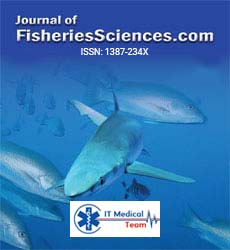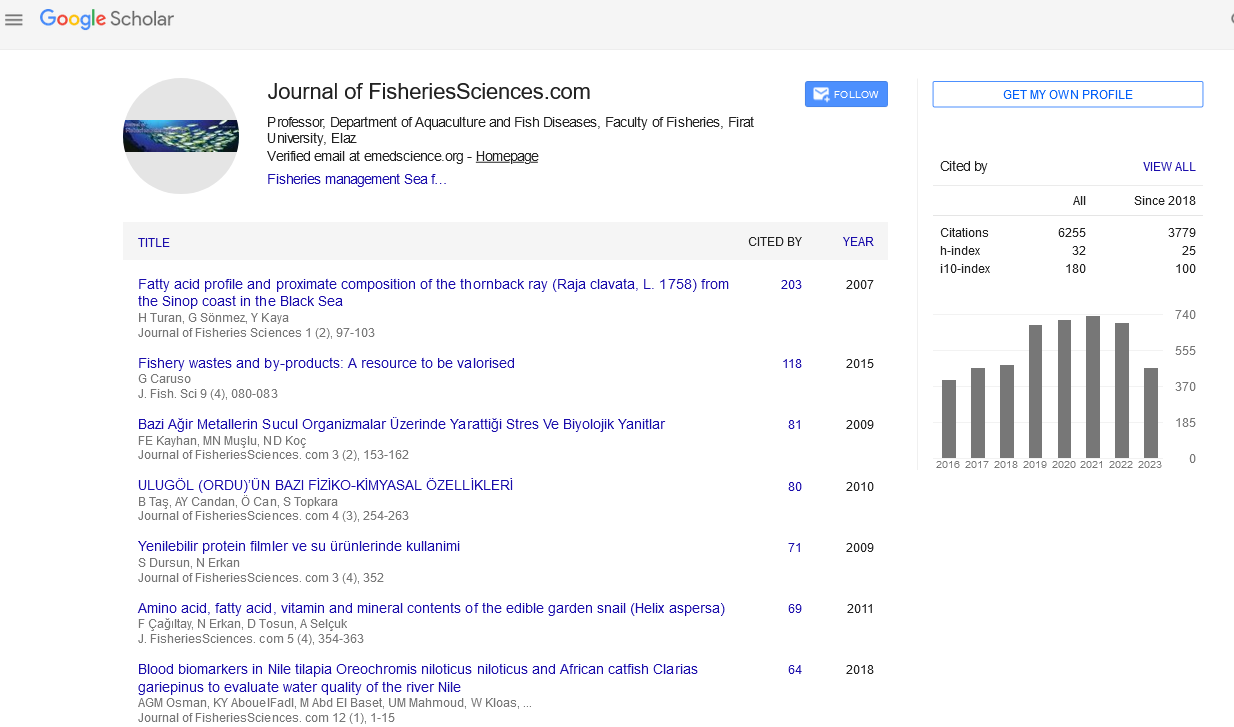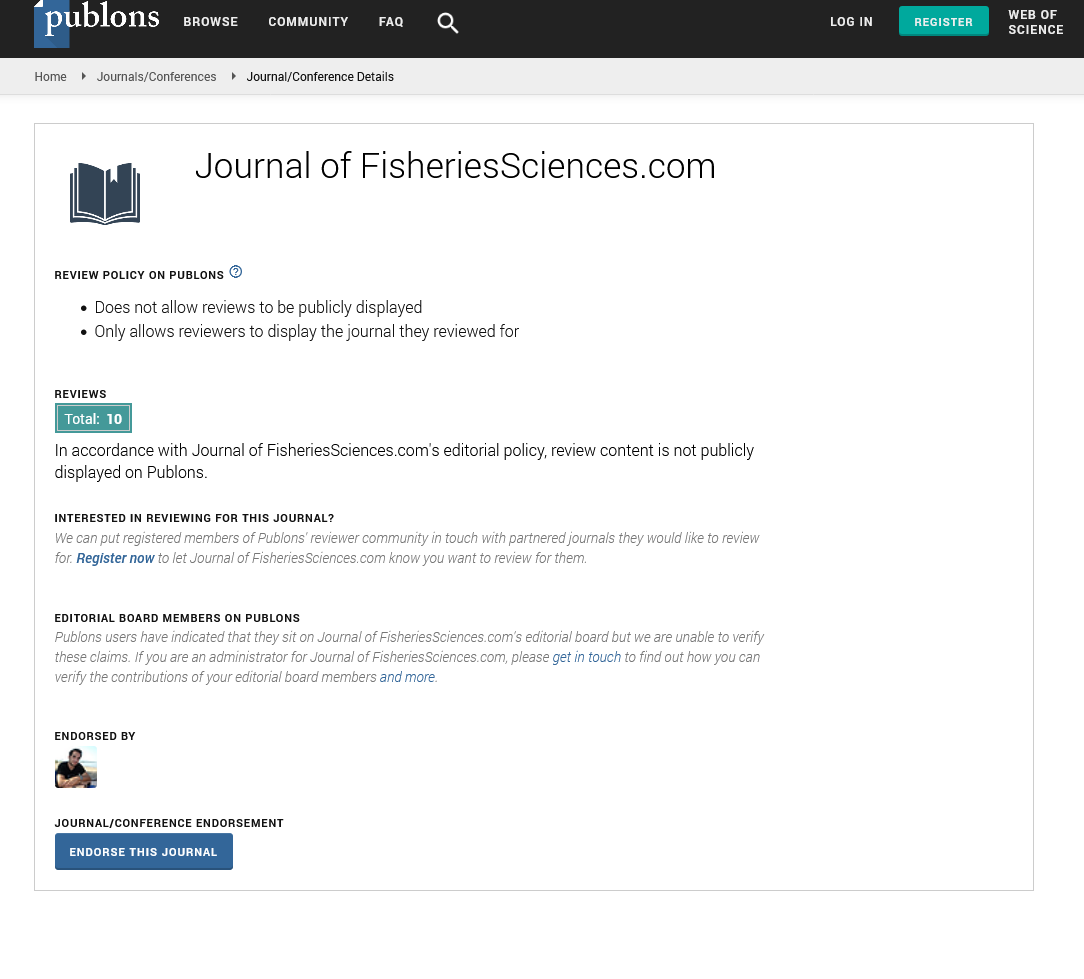Perspective - (2023) Volume 17, Issue 6
Exploring the depths: A comprehensive journey into the intricate world of marine biology
Ashis Saha*
Department of Aquaculture, University of Delhi, Delhi, India
*Correspondence:
Ashis Saha, Department of Aquaculture, University of Delhi, Delhi,
India,
Email:
Received: 13-Nov-2023, Manuscript No. IPFS-23-14376;
Editor assigned: 17-Nov-2023, Pre QC No. IPFS-23-14376;
Reviewed: 01-Dec-2023, QC No. IPFS-23-14376;
Revised: 18-Dec-2023, Manuscript No. IPFS-23-14376;
Published:
26-Dec-2023
Introduction
The world beneath the ocean's surface remains a mysterious
realm, filled with wonders that continue to captivate the
imaginations of scientists and nature enthusiasts alike.
Marine biology, the study of life in the ocean, offers
a fascinating glimpse into the diverse ecosystems and
remarkable creatures that call the underwater world
home. As we celebrate the one-year milestone of our
exploration into the depths, this article aims to provide a
comprehensive overview of marine biology, delving into
its various branches, significant discoveries, and the crucial
role it plays in understanding and preserving our planet's
health.
Description
The basics of marine biology
Definition and scope: Marine biology encompasses the
study of all living organisms that inhabit the ocean,
ranging from microscopic phytoplankton to massive
whales. It extends beyond mere species identification,
encompassing the examination of ecosystems, behaviors,
and the intricate relationships that shape marine life.
Historical overview: From the early expeditions of
naturalists like Charles Darwin to the modern era of
advanced technology, the history of marine biology is a
tapestry woven with tales of exploration and scientific
breakthroughs. The article will highlight key milestones,
such as the discovery of deep-sea hydrothermal vents and
the mapping of the ocean floor.
The diversity of marine life
Microscopic marvels: The world of marine biology begins
with the smallest inhabitants of the ocean-microscopic
organisms that play a crucial role in nutrient cycles and
food webs. The article will explore the diversity of
phytoplankton, zooplankton, and bacteria, shedding light
on their vital functions within marine ecosystems.
Coral reefs: One of the most biodiverse and visually
stunning ecosystems, coral reefs are integral to marine
biodiversity. The article will delve into the formation of
coral reefs, the symbiotic relationship between corals and
algae, and the threats facing these fragile ecosystems, such
as coral bleaching and ocean acidification.
Deep-sea exploration: Venturing into the abyssal depths,
marine biologists have discovered an array of extraordinary
creatures adapted to extreme conditions. From
bioluminescent organisms to bizarre deep-sea fish, the article
will showcase the marvels of the deep sea and the challenges
researchers face in studying this remote environment.
Conservation and environmental concerns
Human impact on marine ecosystems: As human activities
intensify, the health of marine ecosystems is under threat.
Overfishing, pollution, climate change, and habitat
destruction pose significant challenges to the well-being of
marine life. The article will discuss the anthropogenic factors
contributing to these issues and their far-reaching
consequences.
Conservation efforts: Highlighting ongoing conservation
initiatives and success stories, the article will emphasize
the importance of marine protected areas, sustainable
fisheries management, and international
collaboration in safeguarding the future of our oceans.
Technological advancements in marine
biology
Remote sensing and mapping: Cutting-edge technologies
have revolutionized the field of marine biology. The
article will explore the use of satellite imagery and
underwater mapping tools, shedding light on how these
advancements aid researchers in studying large-scale
oceanographic patterns and mapping the ocean floor.
Submersibles and autonomous vehicles: The
development of submersibles and autonomous
underwater vehicles has allowed scientists to explore the
ocean's depths with unprecedented precision. The article
will delve into how these tools enable researchers to study
marine life in its natural habitat, uncovering mysteries
that were once inaccessible.
Conclusion
In celebrating the one-year anniversary of our journey
into marine biology, this article has provided a
comprehensive exploration of the subject, from its
historical roots to the forefront of modern research. As
we continue to unravel the secrets of the ocean, it is
imperative that we recognize the interconnectedness of
all life on Earth and strive to preserve the delicate
balance of marine ecosystems for future generations.






